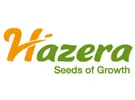
Vegetable seed breeding company Hazera was founded in 2008 when the parent company, the French LimagrainGroup, merged the vegetable breeding companies in the Netherlands and Israel into one global business unit. The company offers more than 1,000 strains in fifteen crops. According to Marcom Project Manager Lando van Doorn, the integration of the Israeli and Dutch companies provided great benefits. “The activities of both companies really complimented each other. From Israel, for example, they had a strong market position in ‘short day onions,’ and from the Netherlands in ‘extra long day onions.’ In Israel we had proper tomato specialists, but they had no position on the Northwestern European market for high-tech greenhouse tomatoes. Together we are now increasing our market on a global level.”
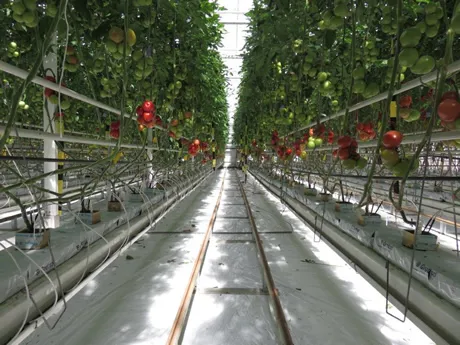
“Hazera was founded in 1939, before the proclamation of the state of Israel had been established. The country had to be built and, under an Arab boycot, it needed a strong industry. Since then the company has boomed, and an agricultural business sector with a high level of technological knowledge was built in the desert. The activities in the Netherlands went through a similar development, with an even longer history,” says Van Doorn. Hazera’s mission is to be a global leader in the field of breeding, development, production and marketing of hybrid vegetable varieties and seeds. The breeding company has two headquarters, one in the Netherlands and one in Israel.
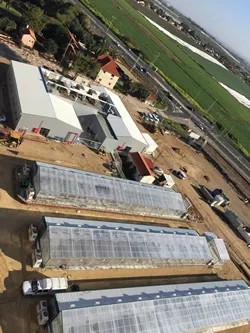
Made (NL) has headquarters, quality control, processing, research laboratory and tomato breeding. Rilland has an onion breeding station, and Tuitjenhorn has an R&D station for Cruciferae (cross-shaped crops). In Warmenhuizen a completely new R&D station is currently being built. In Berurim in Israel a new headquarters and new laboratories have recently been built (pictured right), and that is where the breeding of several fruit vegetable crops, onions, and lettuce happens. At least 17 per cent of sales are invested into R&D, and nearly 30 per cent of over 750 employees work there.
Active locally global
Hazera is part of the French Limagrain Group, an international French agricultural cooperative. This group, which besides vegetable breeding also has branches in arable crops and grain products, realises yearly sales of 2.4 billion euro, and this makes it the third largest seed company in the world. Purely in vegetable seeds, Limagrain only has to tolerate Monsanto being bigger. The vegetable breeding branch is responsible for nearly 30 per cent of sales. Besides Hazera, vegetable breeding companies Mikado Kyowa, Vilmorin and HM-Clause fall under the Limagrain Group. About 2,000 French farmers are the shareholders. “We are both cooperative and multinational. On the one hand we operate globally, on the other hand we are very active locally. That is the strength of our company,” Van Doorn explains.
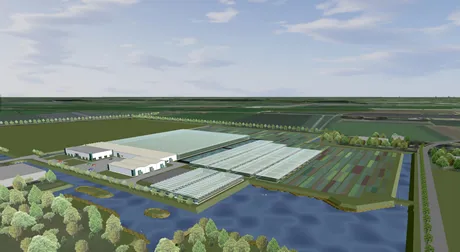
New Cruciferae R&D station
The breeding of crops is a lengthy and complicated process, which involves the latest technological developments. A lot of care goes into the development of strains that are resistent to diseases and pests, but qualities such as yield, reliability and flavour are also important. “It takes ten years before a tomato is commercial, and a biennial crop such as onions could take twenty years, so breeders cannot sit and watch the hype of the moment, they have to look ahead. In general, crossing different strains leads to the optimal combination of genetic qualities. Extensive market research contributes to anticipating a customer’s needs as best as possible. Additionally, this also provides information on requirements new products have to meet. In the last couple of years you also see more steps being taken towards furthering the supply chain, so that eventually it reaches the consumer,” Van Doorn continues.
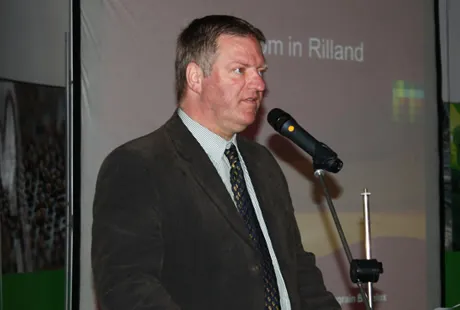
Lando van Doorn
Tomatoes are the main crop for Hazera and the top five is completed with onions, bell peppers, watermelons and melons, closely followed by the crucifer crops, such as cauliflower and headed cabbage. Important markets are Asia/Africa, the Benelux and Scandinavia, Israel and Mexico, followed by the UK, the USA and Germany. “The benefit of integration is that we as a larger unit have more financial elbow room to invest in equipment and installations. That brings our activities to a higher technological level. This enables us to develop new strains quicker. In breeding you are, of course, always looking for the impossible, a variety containing all the qualities and preferably even more. In order to leave little room for manoeuvring in the market and to stay ahead of the game, you must innovate.”
The coming week FreshPlaza travels through California (USA) with the Onion Study Tour, organised by Hazera, and more articles about this breeding company will follow.










